Introduction
September, 2009—ITdotHealth, a National Health Information Technology Forum, has been created through an inter-faculty collaboration at Harvard University. The last year has seen unprecedented plans for investment in health information technology (HIT) by the federal government and we see an urgent need for developing a common set of expectations about the technical, scientific, policy, and business implications of this transformative and rapidly evolving trend.
Founding Team
Kenneth D. Mandl
Harvard Medical School, Children’s Hospital BostonIsaac Kohane
Harvard Medical School, Children’s Hospital BostonMary Lee Kennedy
Harvard Business SchoolDon Oppenheimer
Harvard Kennedy School of Government
Library and Web Services
Abby Clobridge
Harvard Kennedy SchoolGosia Stergios
Harvard Business SchoolMallory Stark
Harvard Business SchoolDavid Osterbur
Harvard Medical SchoolChaim Kirby
Children’s Hospital Boston
Advisors
Ben Adida
Harvard Medical SchoolClayton Christensen
Harvard Business SchoolJohn Collins
Harvard School of Graduate EduationMitch Kapor
Senior Advisor on HIT for the Center for American ProgressJoseph Newhouse
Harvard Kennedy SchoolJohn Palfrey
Harvard Law School
Synopsis
The meeting was highly participatory, and structured to foster dialogue on key technology, regulatory, and business issues. We steered that dialogue toward policy-relevant conclusions and propose approaches to continuing our conversation after the meeting. Aneesh Chopra, the US Chief Technology Officer, and Todd Park, the HHS Chief Technology Officer, led a vibrant conversation on the health internet and opportunities for consumer engagement.
Keynotes:
- Regina Herzlinger, author of Who Killed Health Care?: America’s $2 Trillion Medical Problem – and the Consumer-Driven Cure
- Clayton Christensen, author of The Innovator’s Prescription: A Disruptive Solution for Healthcare
- Mitch Kapor in his new role as Senior Advisor on Health Information Technology at the Center for American Progress.
Day One
1:00 Welcome
Alexa McCray, Harvard Medical School
1:10 Intro and Opening keynote address
Intro: Kenneth Mandl, Children’s Hospital Boston, Harvard Medical School
Keynote: Mitch Kapor, Senior Advisor on Health Information Technology at the Center for American Progress
1:45 Panel #1. Open or closed platform? One or more platforms?
Moderator: Isaac Kohane Children’s Hospital Boston, Harvard Medical School
Sean Nolan, Microsoft
Ben Adida, Indivo project, Children’s Hospital Boston
Hamish Fraser, OpenMRS project, Harvard Medical School
David McCallie, Cerner
3:30 Panel #2. Business-government interaction to support a platform
Moderator: Mark Frisse, Vanderbilt University
Alfred Spector, Google
Rob Kolodner, National Coordinator of Health Information Technology (former), VA (former)
David Liss, New York Presbyterian Hospital
Charles Friedman, Office of the National Coordinator of Health Information Technology
Day Two
8:00am Keynote address
Clayton Christensen, Harvard Business School
9:45 Observations from Day One
Kenneth Mandl, Children’s Hospital Boston, Harvard Medical School
10:00 Models for adoption of the platform
Moderator: Kenneth Mandl, Children’s Hospital Boston, Harvard Medical School
Ahmed Ghouri, Anvita
Mike Stein, Map of Medicine (UK)
Henry Chueh, Massachusetts General Hospital, Harvard Medical School
David Kibbe, American Academy of Family Physicians
Sue Harmon, AthenaHealth
11:15 Framework for Knowledge Sharing
Mary Lee Kennedy, Harvard Business School
11:30 Moderated Discussion on the Healthcare Internet
Aneesh Chopra, Federal CTO, White House
Todd Park, U.S. Department of Health and Human Services CTO
Kenneth Mandl, Children’s Hospital Boston, Harvard Medical School
Isaac Kohane, Children’s Hospital Boston, Harvard Medical School
Mitch Kapor, Senior Advisor on Health Information Technology” at the Center for American Progress
2:00 Closing keynote address and Final statement
Keynote: Regina Herzlinger, Harvard Business School
Final Statements: Kenneth Mandl, Isaac Kohane, Children’s Hospital Boston, Harvard Medical School
Post tenebras lux
We just wrapped up our one and a half day Harvard Meeting on a Health IT Platform. We provide a brief summary here, with more detail and video to follow.
On the first day of the meeting, we heard many of the obstacles and concerns that make data liquidity and application substitutability hard to attain. On the second day, with the keynote bookends of Professors Christensen and Herzlinger, the attendees were galvanized to consider what could be done today. Professor Christensen reminded us that disruption is a normal part of product life cycles across an industry and warned that legacy players, under threat of disruption, often seek to go to Washington to protect the viability of their enterprise. He encouraged pursuing a platform that would promote innovation. Professor Herzlinger brought into focus much of the irrationality and inefficiency that occurs when the consumer of healthcare is not the purchaser. She argued strongly in favor of personal health record platforms as one of the tools to promote information transparency and shared decision-making. Aneesh Chopra and Todd Park vividly communicated commitment to consumer engagement with health information technology.
Informative perspectives from the panels included: avoidable errors in working with monolithic IT health vendors in the United Kingdom; how substitutability can be used to improve the functionality of user interfaces; how architectural decisions can sculpt the constraints to policy and function. We learned that ONC is planning significant support of innovation in health IT and that some vendors are opening up their product to third party developers.
Energy and willingness to act and continue the conversation was high.
Ken Mandl
Zak Kohane
Notes on Day One
Some thoughts on Day One of the Harvard Health Information Technology Platform meeting from John Halamka on his blog, Life as a Healthcare CIO.
Emerging Consensus to Create a ‘Health Internet’ With Broad Consumer Engagement
Boston Children’s Hospital Newsroom, October 9, 2009 — Keri Stedman/Rob Graham
As government, industry and academic leaders work to transform the nation’s health information system, there is increasing interest in the notion of a national health information network in which consumers can actively engage, and which can provide the foundation for an “iPhone-like” ecosystem of applications to compete on price and value. In such an ecosystem, purchasers of applications–whether physicians and hospitals buying electronic health records, or patients and consumers buying technology to support wellness and disease management–would be able to easily substitute any application for any other…
Clicking on a photo will open a carousel of enlargements. Click the “X” in the top left of the carousel to return to this page.
Note: A new browser window will open to play each video. All videos in MP4 format.
Opening (Ken Mandl) and Keynote address – Mitch Kapor
Panel #1. Open or closed platform? One or more platforms?
Panel #2. Business-government interaction to support a platform
Keynote address – Clayton Christensen
Models for adoption of the platform
Framework for Knowledge Sharing
Moderated Discussion on the Healthcare Internet
Closing Keynote address – Regina Herzlinger; Final statements
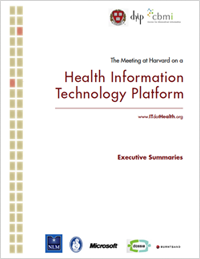
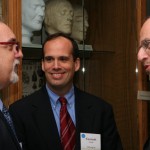
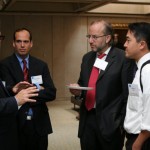




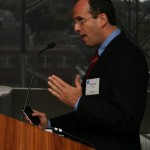
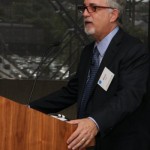








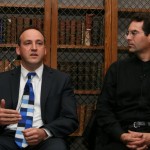






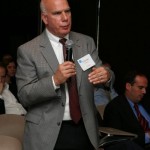



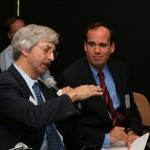


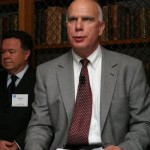










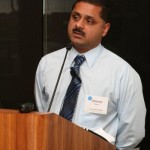




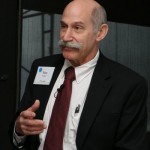






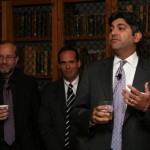
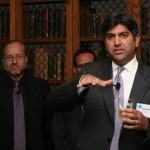



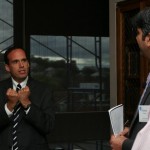

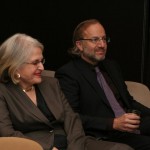


You must be logged in to post a comment.